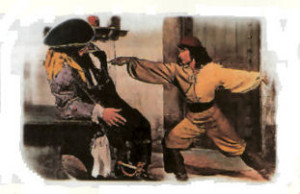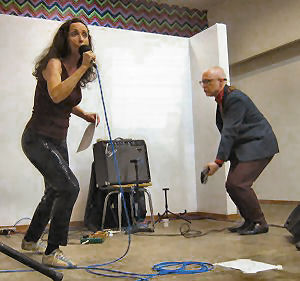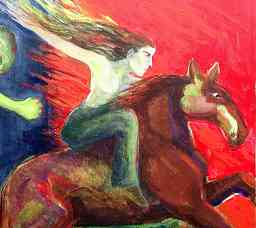Ron Sakolsky
Ron Sakolsky
A Call for Tunnel Visionaries
Reality is a tunnel constructed between the realm of the possible and all that is deemed impossible. Under the aegis of reality, the conceptual limitations of tunnel vision are normalized. By breaking down the tunnel walls, we fully reveal what is ignored, dismissed, or hidden from view by the fetters of reality. Even though we are born in the tunnel, we can imagine life beyond its walls--we can be tunnel visionaries!
Dec 20, 2014 Read the whole text...
Ron Sakolsky
Anarchist Cabaret
a review of
The Anarchist and the Devil Do Cabaret by Norman Nawrocki, Black Rose Books, 2002, 192 pp., $20
Earlier this year, while rummaging through my collection of oppositional music to find some anti-war material in order to counter Dubya’s lies about the invasion and occupation of Iraq, I started my search by going back to the Gulf War of George I. One of the initial jewels to emerge from that pile of recordings was a 1991 cassette by Rhythm Activism, War Is The Health of the State.
Jul 23, 2021 Read the whole text...
Ron Sakolsky
Anarchy in a Diasporic Key
Imagine diasporic anarchy! While not all diasporas are African, I would like to focus upon the affinities between the African diaspora and anarchy using music as a touchstone.
I use the term “diaspora” in Paul Gilroy’s dynamic sense of the “plural richness of black cultures in different parts of the world in counterpoint to their common sensibilities—both those residually inherited from Africa and those generated from the special bitterness of new world racial slavery” (Gilroy, The Black Atlantic).
Aug 19, 2017 Read the whole text...
Ron Sakolsky
As The Shit Hits The Fan
The Economy is in the toilet. Flush it down!
The State is understood as pure and inviolable, as capable of purifying the most repulsive things--even money--through the touch of its divine hand. Money, therefore, is pure insofar as it belongs to the State; so are, by association, those experts who are summoned to serve it. Even today power reenacts that ceremony where the despot shits in honor of his subjects, summoned to laud him for the gift of his royal turd.
-- Dominique Laporte, History of Shit
Apr 5, 2014 Read the whole text...
Ron Sakolsky
Black Star North
“A single star weds the space between two branches.”
-- George Elliott Clarke in Québécité
Lately, I have chosen to do my living, loving, writing, and resisting in British Columbia (BC) Canada. Though I can’t say that I’m an ex-patriot, since I have always despised patriotism; I am currently an expatriate. Canada has long been a destination of choice for American political dissidents like myself, and for such refugees from US oppression as the enslaved Africans who followed the North Star to the last stop on the Underground Railroad (though slavery was by no means illegal in Canada). In 2000, the now deceased African American surrealist poet, Ted Joans, put a new wrinkle on that maroon tradition by swearing that he would move to Canada if George W. Bush became President. Immediately after the election, he moved to Vancouver. For a variety of reasons, in 2002, I followed his ambulatory example by moving to one of the Northern Gulf Islands (which are located in the Strait of Georgia between the West Coast of the Canadian mainland Vancouver Island). Finally fed up, I had escaped the belly of the beast to seek sanctuary on Denman Island.
Mar 15, 2014 Read the whole text...
Ron Sakolsky
Dancing to the Beat of Indigenous Resistance
Black Indian identity charts a course that, by its own hybrid nature, sails beyond the simplistic binaries commonly associated with racial nationalism, while at the same time carving out its own cross-cultural position in the struggle against white supremacy.
In relation to the anarchist/Black Indian connection, as Wilson Harris has noted, “The very ground beneath us has been stolen. I think that’s why Proudhon wrote his book, Property IS Theft.” Harris then goes on to trace his own struggle as a Black Guyanan to the anti-colonial revolt of 1687 fomented by the combined forces of African maroons and Arawak Indians.
Nov 20, 2017 Read the whole text...
Ron Sakolsky
Defenders
dedicated to the U’nis’tot’en Land defenders

Broken leather latch
time’s dispatch
an oil-stained suitcase
containing
tar sands underwear
surrounded by
industrial overwear.
Over where?
Not over here
you bastards
not anywhere!
Jun 4, 2016 Read the whole text...
Ron Sakolsky
First they Came for Ward Churchill
In early 2005, because of comments concerning 9/11 made years earlier, University of Colorado professor Ward Churchill became the whipping boy for right-wing vilification of all that was suspect in American universities.
In “Some People Push Back: On the Justice of Roosting Chickens,” Churchill invoked Malcolm X’s comments immediately following the assassination of president John F. Kennedy as he maintained that American foreign policy provoked the attacks on New York. At root in the controversy was Churchill’s comparison of Americans to the “good Germans” of Nazi Germany and his now famous phrase about “the little Eichmanns inhabiting the sterile sanctuary of the twin towers.”
May 23, 2015 Read the whole text...
Ron Sakolsky
Various Authors
Hellcat Passion
from the London International Festival Of Surrealism; Submitted by Ron Sakolsky, Inner Island Surrealist Group

Game (1) “Shelf Life”
How to Play: You take a series of books off your shelf in the order they sit there. Working through them in sequence, you open them at random, selecting the phrase or clause that strikes you, and create a text in this way. (It’s also possible to make a title in this way). As a variant, this can also be played with more than one player, by taking it in turns to add a sentence, phrase, clause or half-sentence.
Jul 5, 2014 Read the whole text...
Ron Sakolsky
Sean Woods
Hoppin’ Aboard the Underground Railroad
Fiction

The first night after leaving their hide-out in the Vancouver Island woods, Jerry and Max climbed the drawbridge off the last ferry of the day onto what they hoped would be the safety of Inner Island and headed down the beach to avoid meeting anyone.
Inner Island bobbed comfortably in the calm waters between the mountainous spine of Vancouver Island and the mainland Coast. After the indigenous Pentlatch had been decimated by lethal doses of smallpox and colonialism, it had- been settled for the past half century by an assortment of old-time pioneer families, hippie dropouts, draft dodgers, and a scattering of retired criminals.
Oct 31, 2013 Read the whole text...
Ron Sakolsky
How Art and Music Can Change the World
a review of
How Art and Music Can Change the World: Mecca Normal

Over the last 25 years, Mecca Normal has consistently turned up the heat on the theoretical relationship between music and social change by furiously stirring them together in the fiery cauldron of artistic practice. In the process, they have boldly created a unique body of work that has challenged the downpressing gravity of the authoritarian life with a yeasty combination of outrage and subversive laughter. In essence, they have defied gravity, and, in doing so, have urged us all to refuse to be held down when we could be soaring to the outer reaches of possibility, or, better yet, demanding the impossible. Their music is not designed to present us with a dry polemic on the “one-best-way” to be politically active or offer a pat answer on how to live our lives according to anybody’s party line. Instead, it is a direct call to see through the bullshit and make our own choices.
Dec 29, 2013 Read the whole text...
Ron Sakolsky
Imagine Global Revolution
What I love about
the occupy movement
is that it makes
no demands.
Is
a space
in which possibility
expands.
An opening
for imaginations
to upset
the applecart
of acquiescent
relations.
Imagine
clearing the slate
opening the gate
rejecting
the horrors
of industrial civ
un-Occupying
Oct 13, 2013 Read the whole text...
Ron Sakolsky
Music review: d’bi young
a review of
d’bi young. Wombanifesto.
www.dbiyoung.net
Invoking Elegua to open the musical floodgates, d’bi young wastes no time in unleashing bold soul sonic vibrations that ripple through the body and mind, swiftly but surely navigating the resulting rapids to carry us along on the raging (as in outrageous and outraged) river of her creativity.
Dec 29, 2013 Read the whole text...
Ron Sakolsky
No More Safety Valves
The Government Has Approved Low Power FM Stations, but Resistance Radio Continues
Freedom is a word with many meanings. What makes radio free from an anarchist point of view? In relation to the airwaves, the term commonly refers to a form of direct action broadcasting done without a government-approved license. It is popularly known as pirate radio.
The autonomous broadcasters of the free radio movement actively expand the everyday lived experience of freedom from state regulation by seizing the airwaves from their corporate and government masters, setting up unlicensed stations and helping others to do the same. On the other hand, the Prometheus Radio Project is a non-profit organization created by former radio pirates to facilitate the growth of a Federal Communications Commission (FCC) program known as Low Power FM (LPFM).
Apr 23, 2015 Read the whole text...
Ron Sakolsky
Occupying the Citadels of the Mind
A Review of Two Insurgent Documents from the Frontlines of Educational Revolt (2009–2012)
a review of
After the Fall: Communiques from Occupied California by Aragorn! Edited by Little Black Cart Books, Berkeley, 2010. This free newsprint publication is presently out of print, but can be downloaded at afterthefallcommuniques.info.
One of the key essays, “We Are The Crisis,” appears in Occupy Everything: Anarchists in the Occupy Movement, 2009 2011 by Aragorn!, Little Black Cart Books, Berkeley, 2012, 258pp, $15
Jun 23, 2013 Read the whole text...
Ron Sakolsky
On Don LaCoss’s Passing
a tribute

One of Don’s last research projects was on the history of Egyptian surrealism, so it is fitting that his death was poetically heralded by a popular insurrection in the streets of Cairo.
As the founding manifesto of the 1973 Arab Surrealist Movement in Exile exclaimed as if in anticipation of the possibilities opened up by recent events in Tunisia and Egypt: “We call upon individuals and the masses to unleash their instincts against all forms of repression, including the repressive ‘reason’ of the bourgeois order. We poison the intellectual atmosphere with the elixir of the imagination, so that the poet will realize himself in realizing the historical transformation of poetry. We liberate language from the prisons and stock markets of capitalist confusion.”
Dec 24, 2013 Read the whole text...
Ron Sakolsky
Only a Beginning
Review
a review of
Only a Beginning: An Anarchist Anthology. Edited by Allan Antliff. Arsenal Pulp Press. 2004. 352 pages. $25. Available from The Barn.
Left liberals in the United States laud Canada as a sort of parallel universe: a North American welfare state paradise where everyone has health care; foreign policy is about international peacekeeping; and a national propensity for politeness is translated into public discourse as civility. It’s a mythic place where anger doesn’t exist (except perhaps on the hockey ice), and anarchism is as genteel as a George Woodcock poem.
May 8, 2015 Read the whole text...
Ron Sakolsky
Out of the Fog
On Jan. 1, 2024, the city of San Francisco sent New Year’s greetings to its beleaguered citizens with the cheery news that a suicide net had been installed under the Golden Gate Bridge thanks to funding from the California Mental Health Services Act.
Heralded as a “suicide deterrent system,” the supposedly solid rationale behind this marine grade stainless steel safety net, upon closer examination, turns out to be not so surprisingly full of holes. The erstwhile proponents of this costly $217 million bridge boondoggle have simplistically argued that if access to the material means of suicide are reduced, then deaths can be prevented. Just put up a net under the bridge to catch would-be suicides...presto, problem solved!
May 13, 2025 Read the whole text...
Ron Sakolsky
Polish Oranges
How the Orange Alternative, a band of surrealist provocateurs, helped bring down Poland’s Communist government in the 1980s
a review of
Lives of the Orange Men by Major Waldemar Fydrych, edited by Gavin Grindon, translated by David French, with an introduction by the Yes Men Minor Compositions/Autonomedia, 2014, 330 pp.
While many historically-minded radicals are familiar with the imaginative counter-cultural actions undertaken by the Dutch Provos in the 1960s, the Orange Alternative’s subversive cultural resistance tactics emanating from Poland in the 1980s are less well known.
Feb 25, 2016 Read the whole text...
Ron Sakolsky
Precarious Dreams
Defending our Imagination from hi-tech Takeover
Just as obtaining job-related income is being made more precarious every day by automation, our sleeping hours are now increasingly under siege by the forces of techno-capitalism. In order to more fully understand the growing vulnerability of our dreams to corporate manipulation, the recent phenomenon of “dream incubation”, which involves the implantation of marketable dreams in our heads, is worthy of further investigation.
Jul 17, 2022 Read the whole text...
Ron Sakolsky
Refusing the Marketplace
“Lady
with the very modern illness
agoraphobia
but ancient as fear
in a Greek marketplace
Lady
I have seen your face
crumple and break in ecstasy
of terror of horror of being
alive in the sewer world
feeling alien thoughts beating
at your mind an office desk
protruding from one ear
a subway train from the other
bells clanging gongs shouting
while you’re washing the dishes
terror
of the market place
and falling
falling into that white place
without shadows
where the rivers are milk
and Lethe dreams
and nothingness has no horizon...”
Nov 12, 2015 Read the whole text...
Ron Sakolsky
Rocks in my Pillow
Book review
a review of
Anarchy and Art: From the Paris Commune to the Fall of the Berlin Wall, by Allan Antliff, Arsenal Pulp Press, 2007
“Do you believe,” she went on, “that the past dies?”
“Yes,” said Margaret. “Yes, if the present cuts its throat.”
--Leonora Carrington
When I first heard about this project, I was excited at the prospect of a book entirely devoted to the history of anarchy and art. Sadly though, the result is a disappointment. Politically-speaking, the book rides the fence between the anarchist milieu and the authoritative voice of academia when what is needed is a sturdy pair of wire cutters, perhaps a catapult, or maybe even a battering ram. For me, the most positive aspect of the book is that its essays stimulated my critical thinking in response to its arguments. To be fair, attempting to write a history of the confluence of anarchy and art from the Paris Commune (1871) to the fall of the Berlin Wall (1989) is such a monumental project that much of the story will inevitably fall into the cracks of the eight episodic chapters that comprise its less than 200 pages. When I initially skimmed the book, I expected to be writing a basically positive review with my main critique being about the way in which surrealism is handled. However, upon actually reading it with some care, I soon realized that the book is problematic from start to finish.
Oct 11, 2014 Read the whole text...
Ron Sakolsky
Surrealism is (Still) Elsewhere
Like anarchy, surrealism boldly demands the impossible
It seems that the more art school training one receives at the academy, the more one is likely to be confused about surrealism or overtly hostile to it. Much of the malaise around surrealism in art circles stems from the insularity of the art world itself.
While surrealist ideas and practices can be expressed artistically, surrealism cannot be reduced to a style or school of art, even one aimed at inspiring radical political action. Nevertheless, surrealism is typically portrayed by academics as merely one historical moment in the grand cavalcade of failed avant-garde art movements of the 20th century.
Oct 20, 2014 Read the whole text...
Ron Sakolsky
Surrealism on the Barricades
excerpt from
Breaking Loose: Mutual Acquiescence or Mutual Aid? LBC Books, 2015, lbcbooks.org
Back in 1995, as the banlieues burned, the Paris Surrealist group put out a tract entitled Warning Lights: A Surrealist Statement on the Recent Riots in France, delineating the unrealized potential of such multi-racial uprisings in the inner suburban immigrant quarters to spread across the country.
Jun 6, 2017 Read the whole text...
Ron Sakolsky
Teaching Anarchy
There are many anarchist approaches to education from free-schooling to home-schooling to de-schooling and beyond. The experience recounted here occurred in a much less receptive learning environment.
For twenty years I taught a course, entitled “Anarchy and Social Change,” at a university that was at first fairly experimental (student-centered, no grades, interdisciplinary, participatory decision-making and self-designed degrees), but which, over the years, deteriorated (though not without a battle) into the “anywhere USA” franchise of bureaucratic education that is so widespread today.
Jun 1, 2016 Read the whole text...
Ron Sakolsky
The Economy is in the toilet
Flush it down.
Why save Wall Street when the shit hits the fan and the economy plunges down the toilet? Let it drown in its own cesspool of toxic debt. Since money is symbolically a form of excrement, poetic justice demands that stockbrokers and bankers suffocate in their own shit.
The global capitalist economy has collapsed like a house of cards in a shitstorm. Yet, instead of celebrating the crash by dancing in the ruins, the wage slaves and their overseers are busily deciding how to shore it all up again.
Mar 6, 2016 Read the whole text...
Ron Sakolsky
The Ludic Path to Utopia
a review of
Utopian Prospects, Communal Projects: Visionary Experiments in Literature and Everyday Life, Andy Sunfrog Smith, self-published, 2000, 65 pages, $12. Available from the author, post paid, at 1467 Pumpkin Hollow Rd. Liberty, TN 37095
As the late Middle Western novelist, Meridel Le Sueur, once advised her younger anarchist biographer Neala Schleuning in relation to a question about her philosophy, “That’s the problem with you intellectuals. You constantly want to analyze. Life’s not like that. I’m not like that. Writing isn’t like that. Not real writing. You have to be in a wholly different place. Get rid of those dead, lifeless forms! How do they teach you to write? Beginning, middle, end? That’s not life. And that’s not writing.” As the illusions of objective scholarly research fell away at Merida’s prodding, Schleuning’s approach was liberated from the weight of academic posturing, and the insightful nature of her understanding of the subject of her thesis was heightened accordingly.
Mar 22, 2021 Read the whole text...
Ron Sakolsky
The Marvelous Dance of Anarchy & Individuality
On the occasion of Emma Goldman’s 150th Birthday
“There is no individuality without liberty, and liberty is the greatest menace to authority.”
—Emma Goldman, The Individual, Society and the State (1937)
The figure of Emma Goldman still looms large on the anarchist horizon, not least because of her passion for proclaiming the liberty necessary for individuality to flourish as an essential ingredient of any social revolution worthy of the name.
Jan 28, 2020 Read the whole text...
Ron Sakolsky
The Parable of the Horseshoe Crab & the Seagull
“What have you got in your pockets, Apple Hat?” asked Mr. Anthill pulling at them. “Guts? Electric trains? Horseshoe crabs?”
—W.A. Davison and Sherri Higgins, La Chasse A L’Objet Du Desir
Once, while in my teens, my girlfriend and I were walking along the shores of Plum Beach in Brooklyn on a sultry summer evening to get a breath of fresh air under a full moon. As we walked along the shoreline, we spotted lots of horseshoe crabs that had been overturned on their backs when the tide had gone out.
Apr 14, 2020 Read the whole text...
Ron Sakolsky
Thin Ice, Deep Water
The Vancouver Hockey Riots
The surging waters of the collective unconscious that were unleashed in the Vancouver “Hockey” Riot of June 2011 made it abundantly clear just how fragile the artificial ice age of industrial civilization can be when it comes in contact with the searing heat of the moment.
Faced with the nagging miserabilism of daily life, the emotional dam of mutual acquiescence finally burst its walls and a tidal wave of repressed desire obliterated the illusion of social peace.
Oct 28, 2013 Read the whole text...
Ron Sakolsky
Toward A Surrealist Re-Enchantment of the World
Anarchy and surrealism have had many enchanting encounters over the years, and the convivial nature of their ongoing interplay is easy to understand. Much like anarchists, surrealists are dissatisfied with the impoverished version of reality that governs our relationship to the world and to one another.
Aug 26, 2019 Read the whole text...
Ron Sakolsky
Tuning in to the illegalist continuum
Bank Robbers on Land, Buccaneers at Sea, Pirate Radio
The Bonnot Gang were notorious anarchist bank robbers whose daring exploits in pre World War One France were legendary examples of illegalism. In contrast to the stalwart proletarian solidarity prized by the anarcho-syndicalists of that time, the illegalists saw no need to wait for the Great General Strike to reappropriate the fruits of their labours. Instead they were determined to act on their immediate desire for a direct expropriation of wealth. And what better place to find it than at a bank.
Apr 8, 2014 Read the whole text...
Ron Sakolsky
Tuning in to the Media Dreamscape

From September 10–15, the Cascadia Media Alliance hosted a Reclaim The Media Convergence in Seattle. Held during the week of the annual convention of the National Association of Broadcasters (NAB), this occasion was an opportunity to protest the corporate-driven policies of the NAB/FCC/NPR triumvirate, as well as to gather for our own grassroots shadow convention. Community media activists from all over North America descended upon Seattle to hear speakers, do workshops, strategize and bounce off each others’ creative energy. By the end of the convergence 10 free radio stations had been set up just 2 band widths apart on the FM dial in open defiance of the censorious 3 bandwidth low power fm requirement of the FCC. This rule has in effect created a situation in which LPFM stations are not legally feasible in urban areas like Seattle. The eclectic programming mix of these pirate stations featured everything from guerrilla radio broadcasts of the FCC actually battering down the doors of Free Radio Austin, to a satirical piece about Clear Channel by Mark Hosier of Negativland, to a series of 3 minute airplay spots on the subject of “media and democracy.” I was invited to kick off the week’s events with a presentation at the Seattle IMC. Focusing on the affinities between anarchism and surrealism in relation to media activism. My talk, upon which the following article is based, consciously avoided the self-congratulatory approach of keynote speakers David Barsamian and Amy Goodman, and instead sought to raise thorny strategic questions for anarchists involved in the media democracy movement.
Jun 6, 2021 Read the whole text...
Ron Sakolsky
Where are You, Arnold Shultz?
Though he never recorded, his spirit hovers over the American musical imagination, whispering his hidden secret worldwide to all those with ears to listen to the interraciality of what is typically portrayed as racially separate.
Receiving his slave name from Revolutionary War veteran and slavemaster Mathias Shultz of the Green River region of western Kentucky, Arnold was the child of the last of his ancestors to have once lived in slavery. He began as a songster playing guitar around the turn of the twentieth century. At this time in isolated mountain communities, those of African-American and European-American descent made music together at square dances, picnics, and other occasions calling for string bands.
Aug 19, 2017 Read the whole text...
Ron Sakolsky
Why be so Attached to your Penis?
A fellow creature that gives new meaning to the phrase, “going both ways”
Download MS Word .doc [29 kb] fe-389-13-Why-Penis
“I haven’t seen anything like this before.”
-- Bernard Picton, Curator of Marine Invertebrates, National Museum of Northern Ireland
Could the surreal imagination of even Karel Capek in his most bitingly satirical novel, War With The Newts, ever have conceived of a game-changer the likes of chromodoris reticulata, a red and white sea slug that can actually shed its own penis after mating and then replenish said appendage the very next day.
Jun 29, 2013 Read the whole text...
Ron Sakolsky
“Y” Is A Crooked Letter
What kind
of anarch
am I
on my
best days?
The kind
that eludes
the prisons of
“ists” and “isms”
for the
freedom
of the
“Y”.
Why?
That is
the question.
During
my childhood
daze
my mother
dismissed
my incessant
questioning
of her
authority
(my why-ning
as she called it)
with her favorite
parental
pronouncement,
“Y
is a
crooked letter.”
Jul 1, 2014 Read the whole text...

